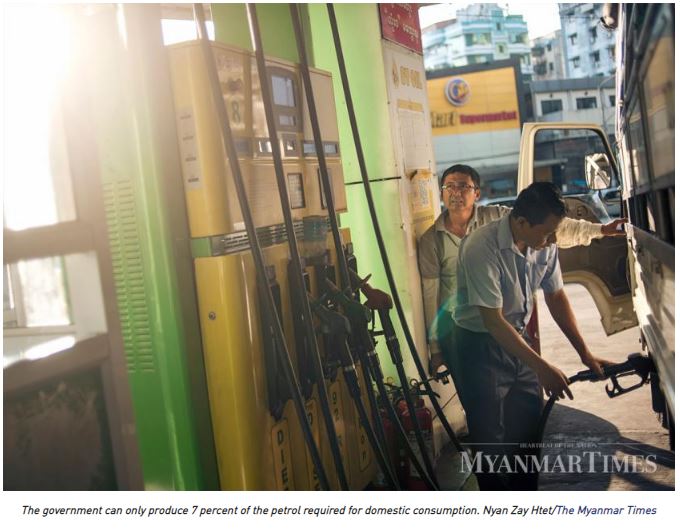Myanmar: Still no new takers in deregulated domestic fuel market
Despite the relaxation of regulations for foreign investors to enter the fuel import and distribution business in Myanmar, no new companies have entered the market over the last year, said U Thant Sin, vice chair of Supervisory Committee for Petroleum and Petroleum Product Enterprises at a press conference on October 11.
Previously, the Ministry of Energy stipulated that foreign businesses wishing to enter the local fuel import and distribution business had to do so under a joint-venture with a local partner. However, this requirement was dropped by the Myanmar Investment Commission last April, and the sector is now open to foreign direct investment.
Following the relaxation of the regulation, several foreign entities made enquiries about entering the local market although none have done so yet.
“The sector is not restricted from foreign investment as some people might still think. It is open though no one has invested yet. This sector has been open for more than one year. So far, foreign investors have only said that they are still studying the local market, though we feel foreign investment is likely to come,” said U Thant Sin.
“Some interested parties cited land issues as a hindrance to investing, but when they were offered land other issues cropped up. At present, there is only one foreign investment by Puma Co. which is working as a joint-venture with a local firm.
“The regulations for importing and distributing fuel also fall under the purview of the Ministry of Electricity and Energy for both local and foreign investors and the ministry is also reviewing its previous rules for partnerships with foreign corporations in order to attract foreign investment,” he said
“We’re keen to attract foreign corporations for importing, distributing, and selling petrol. We will grant investors land here to run their businesses. They can construct storage tanks and store the fuel. They can then export and sell it wherever they want. And when domestic petrol businesses purchase, it will be sold according to market prices. With all this, we hope to lower fuel prices and the cost of transportation in the,” said U Thant Sin.
“The government can only produce 7 percent of the petrol required for domestic consumption so private businesses have to purchase primarily from Singapore and resell it. This results in price fluctuations depending on a contract mechanism that derives its value by referencing the average of a set of Singapore-based oil price assessments published by Platts, a global provider of information on energy and petrochemicals. Rising oil prices and exchange rates means higher fuel prices for end-users,” he added.
There are also plans to link up with other nations with cheaper fuel price, as the domestic fuel sector depends solely on Singapore at present.
“If we compare the prices in ASEAN countries such as Malaysia and Brunei, they have lower fuel prices than our country,” he said.
Currently crude oil prices are rising and the ministry is controlling local prices to protect consumers. He said short-, medium-, and long-term projects for keeping fuel prices steady are being studied.
Among the ideas being considered is lowering the cost of transporting fuel within the country through the use of pipelines or the rail system.
Source: https://www.mmtimes.com/news/still-no-new-takers-deregulated-domestic-fuel-market.html


 Thailand
Thailand




